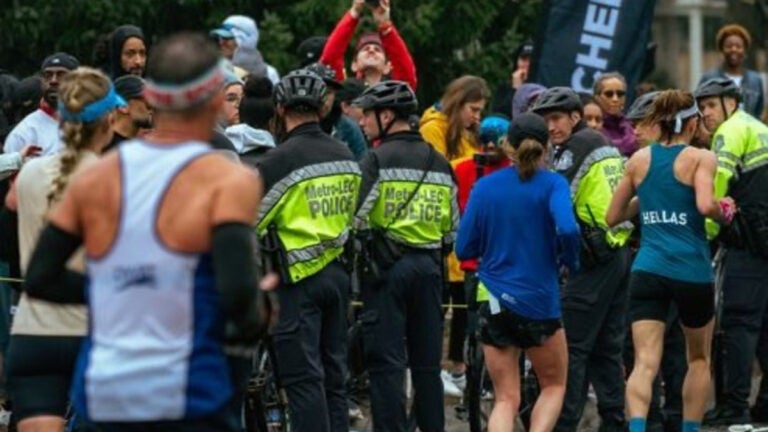Local News
Members of a running crew for women of color allege the Boston Athletic Association and Newton officials violated their civil rights during the 2023 Boston Marathon.

Last year, the Boston Athletic Association and Newton officials were sued by members of TrailblazHers Run Co., a local all-female running group. That lawsuit stemmed from an incident at the 2023 Boston Marathon, where members of TrailblazHers were allegedly “unjustly targeted” by the Newton Police Department at the behest of the BAA.
A federal judge on Thursday denied attempts from the defendants to dismiss claims of racial discrimination, allowing the legal challenge against Newton and the BAA to continue.
Lawyers representing TrailblazHers hailed the ruling as a “major victory.”
“This ruling is a crucial step toward justice for TrailblazHers and all those who were targeted simply for showing up in support of their community,” Mirian Albert, a senior attorney at the Boston-based Lawyers for Civil Rights, said in a statement. “The BAA should be ashamed of itself for continuing this fight against spectators of color, instead of enacting reforms to make sure that this type of egregious racial profiling does not occur at the Boston Marathon ever again.”
The judge, however, did dismiss a claim made by the plaintiffs that the BAA and Newton “conspired” to deprive the running group members of their civil rights.
The incident
Many of the details of the incident were laid out in the initial complaint filed last year. It began when police responded to a cheering section at Mile 21 in Newton during the 2023 Boston Marathon. Two prominent running groups, including TrailblazHers, had set up in the area to cheer on members that were running the marathon. Many of the spectators there were people of color.
After one spectator launched a confetti cannon in the early afternoon, a Newton police officer allegedly grabbed the spectator’s shirt, demanded identification, and threatened to arrest them. The spectator calmly explained that they were not obstructing the race, the complaint alleges, but officers continued to yell at the spectators and tell them to move back, even though no one was obstructing the race. At the same time, police ignored white spectators nearby who were engaging in similar behavior, according to the complaint.
A spectator contacted the BAA and police briefly left the scene, but a larger group of about 20 officers soon returned to form a “human barricade.” Other officers on motorcycles gathered behind the spectators, effectively penning them in, the plaintiffs said.
“Plaintiffs were taken aback by the substantial police presence and show of force. They feared for the safety of their members who were spectating, and also for the safety of those running. Many BIPOC runners were shocked to see police officers concentrated at the only section of the marathon route with many spectators of color,” they said in the initial complaint.
Westwood Police Chief Jeffrey Silva, head of the Metropolitan Law Enforcement Council, told Boston.com around the time the lawsuit was filed last year that officers were called to the scene three times at the request of the BAA for reports of spectators going past boundaries and onto the course.
The plaintiffs contend that “it is not uncommon for marathon spectators to briefly enter onto the course in moments of excitement.”
There were no arrests or physical altercations between police and spectators during the incident, Silva said. An internal review found that the officer acted properly.
A BAA spokesperson did not respond to a request for comment Friday.
“For too long, spaces that should uplift and empower all runners have instead silenced, excluded, and policed Black and Brown bodies. But we refuse to be erased,” Abeo Powers, a founding member of TrailblazHers, said in a statement.
Claims and recent rulings
The lawsuit centers on three claims. First, the plaintiffs say that BAA and Newton officials violated their civil rights under the 14th Amendment. Second, they say that the defendants explicitly conspired to interfere with the civil rights of the spectators. Third, they say that the defendants violated a state law that ensures all people have the right to full and equal accommodations in applicable public places.
Concerning the first claim, Judge Indira Talwani ruled that the the plaintiffs plausibly alleged a “symbiotic relationship” between the BAA and the Newton Police Department during the marathon, and plausibly alleged selective treatment based on race. She therefore denied the BAA’s motion to dismiss the claim.
Talwani ruled in favor of the BAA and Newton regarding the second claim. While the plaintiffs alleged that the BAA and Newton officials “conspired” to deprive the spectators of their rights, no alleged facts support the inference that the BAA and Newton officials “entered into a tacit agreement to target Plaintiffs for the purpose of impairing their Equal Protection rights,” Talwani wrote.
Talwani refused to dismiss the third claim, that the defendants violated the Massachusetts Public Accommodations Law. The BAA and Newton officials tried to make the case that the Boston Marathon is not a place of “public accommodation.” Talwani cited a previous ruling from the state’s highest court that parades occurring on public streets fall within the scope of the Public Accommodations Law. The plaintiffs adequately allege that the Boston Marathon is public in nature, she wrote.
“Today, we stand on the side of justice, progress, and truth,” Elizabeth Rock, founding member of TrailblazHers, said in a statement. “The court’s decision to move forward with our case against both the BAA and the City of Newton is more than just a legal victory — it is a resounding affirmation that our voices matter, our experiences are valid, and our fight for equity in running is necessary.”
Sign up for the Today newsletter
Get everything you need to know to start your day, delivered right to your inbox every morning.
